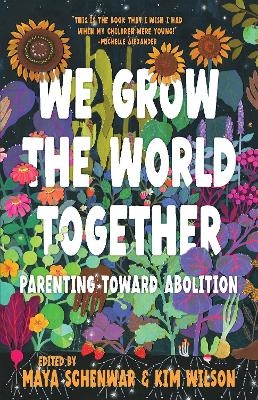
We Grow the World Together
Haymarket Books (Verlag)
979-8-88890-299-8 (ISBN)
Abolition has never been a proposal to simply tear things down. As Alexis Pauline Gumbs asks, “What if abolition is something that grows?” As we struggle to build a liberatory, caring, loving, abundant future, we have much to learn from the work of birthing, raising, caring for, and loving future generations.
In We Grow the World Together, abolitionists and organizers Maya Schenwar and Kim Wilson bring together a remarkable collection of voices revealing the complex tapestry of ways people are living abolition in their daily lives through parenting and caregiving. Ranging from personal narratives to policy-focused analysis to activist chronicles, these writers highlight how abolition is essential to any kind of parenting justice.
Contributors include:
Beth Richie
Harsha Walia
EJ, 6 years old
Dorothy Roberts
Ruth Wilson Gilmore
Dylan Rodríguez
Bill Ayers and Bernardine Dohrn
Shira Hassan
Victoria Law
Mariame Kaba
The PDX Childcare Collective
adrienne maree brown and Autumn Brown
and more
Maya Schenwar is director of the Truthout Center for Grassroots Journalism and board president at Truthout. She is the co-author (with Victoria Law) of Prison by Any Other Name: The Harmful Consequences of Popular Reforms and the author of Locked Down, Locked Out: Why Prison Doesn’t Work and How We Can Do Better. Schenwar has written for The New York Times, The Guardian, The Nation, among others. Schenwar is a cofounder of the Chicago Community Bond Fund and organizes with the Love & Protect collective. She lives in Chicago with her partner, child, and abolitionist cat. Kim Wilson is an educator, self-taught artist, and cohost and producer of the Beyond Prisons podcast. Dr. Wilson holds a Ph.D. in Urban Affairs and Public Policy, a Master’s in Education in Adult and Organizational Development, and a Bachelor’s in Business Administration with a concentration in Human Resources. Wilson’s work has appeared in Shadowproof, Truthout, and Abolition Journal, and her art has been shown in galleries across the country. She lives in Chicago.
Foreword
By Beth Richie
Introduction: From Prisons to the Playground, Caregiving and Abolition Intertwine
By Maya Schenwar
Part 1: Lessons From Our Kids, Lessons From Our Parents
I Want to Start School So I Can Learn to Write Letters to My Dad in Prison
By EJ, 6 years old
The Work of Making Life: Four Vignettes on Abolitionist Caregiving in Practice
By Harsha Walia
Parenting Toward Abolition From Inside Prison: A Letter to My Daughter
By Erika Ray
“An Imagination Party”: How My Toddler Fuels My Abolitionist Vision
By Maya Schenwar
Walking Side by Side With My Mother: A Reflection on Abolition and Accountability
By Jnana
“It Opened My Heart”: Lessons From Being Parented by an Abolitionist
By Paul LaCombe, interviewed by Kim Wilson
Saying Goodbye to My Grandmother From Prison
By Antoniese Gant
A Mother's Neverending Pain From Incarceration: The Ongoing Fight to Restore Dignity
By D’Marria Monday
Interdependence at the End of the World: Abolitionist Parenting Beyond Happiness
By Sarah Tyson
Part 2: Parents and Caregivers in Movement
The Legacy of Black Mothers’ Radical Resistance of Care
By Dorothy Roberts
Mama Solidarity and the Founding of Moms United Against Violence and Incarceration
By Holly Krig
Free Gilbert Jones: The Early Political Geography of Mothers ROC
By Ruth Wilson Gilmore
Learning From Claudia Jones: Mobilizing Parents Toward Liberatory Political Consciousness in the Face of a Right-Wing “Parents’ Movement”
By Kaitlin Noss
Parental Tools for Abolition: Some Dad Shit
By Dylan Rodríguez
Out of Many, One: Our Adventures in Parenting Toward Freedom
By Bill Ayers and Bernardine Dohrn
Part 3: Caregiving Dreams Beyond Normative Family Structures
Queer Family as an Intervention on Police Violence: Abolition and the Beauty of Choosing our Loved Ones
by Shira Hassan, interviewed by Maya Schenwar
Empire and Colonization Operate Through Family. How Do We Disrupt Them in Our Homes?
By Stacey Austin and Nadine Naber
Building an Abolitionist World Includes Supporting Caregivers. Here are 6 Concrete Ways to Do That.
By Victoria Law
He Calls Me Zaza: A Nonbinary Roadmap to Liberation
By Keisa Reynolds
Shelter and Shower Toward Abolition: A Reflection on Collective Care, Reproductive Justice and Educational Justice
By Anya Tanyavutti
Part 4: Practicing Abolitionist Caregiving
Using Children’s Books as a Tool for Abolition
By Mariame Kaba, interviewed by Maya Schenwar
In Order to Talk to My Child About War and Prisons, I Must Talk to Him About Resistance
By Ryann Croken
Kids Are Wondering… What Is Abolition?
by the PDX Childcare Collective
Passing On: Practicing Restorative Justice at Home
By Jennifer Viets
How Do We Survive—and Parent—With Our Love Intact?
By adrienne maree brown and Autumn Brown
Confronting Copaganda: How to Challenge Cartoon Cops and Officer Friendly
Rania El Mugammar
We Love Ourselves, Too: Stewarding Possibilities Together
By Alejandro Villalpando and Susana Victoria Parras
Conclusion: Continuing to Learn and Grow
By Kim Wilson
| Erscheinungsdatum | 13.11.2024 |
|---|---|
| Zusatzinfo | B&W illustrations |
| Verlagsort | Chicago |
| Sprache | englisch |
| Maße | 5 x 8 mm |
| Themenwelt | Sozialwissenschaften ► Politik / Verwaltung ► Politische Theorie |
| Sozialwissenschaften ► Soziologie ► Gender Studies | |
| Sozialwissenschaften ► Soziologie ► Mikrosoziologie | |
| ISBN-13 | 979-8-88890-299-8 / 9798888902998 |
| Zustand | Neuware |
| Haben Sie eine Frage zum Produkt? |
aus dem Bereich


